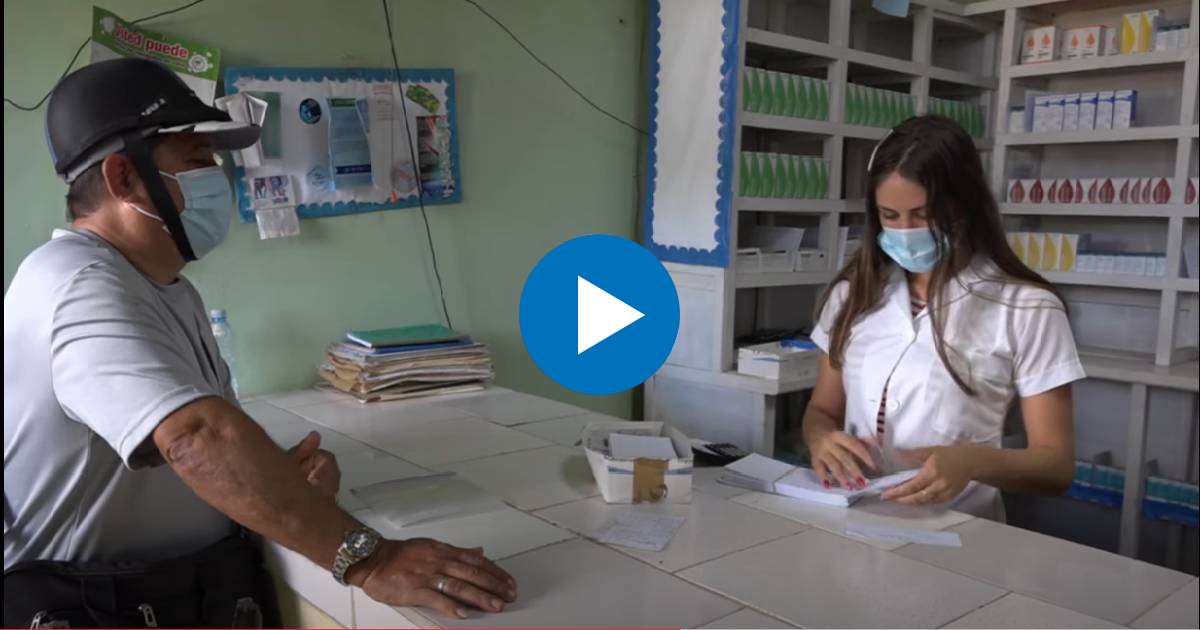
Given the widespread shortage of medicines throughout the country, the authorities of Pinar del Río ordered the regulated sale of drugs in family doctor's offices.
A report from the local television station Tele Pinar gives an account of the operation of this distribution system in the municipality of Sandino, where for several months doctors have been in charge of selling medicines in their own offices according to the patients' needs.
The official media interviewed an alleged manager of the town, whom it never identified, and who explained that the measure is national in nature and is due to the "low coverage of medicines in the country." At the same time, he justified the decision to transfer the functions of pharmacies to family doctors with the argument that they are the most qualified and are closest to the population.
“This distribution of medications by clinics is an indication at the provincial level, at the country level, due to the situation we have with low medication coverage. The conclusion was reached to distribute by office so that the doctor, who is the most trained personnel and is closest to the population, can distribute the medications depending on the patients' needs," he said.
According to the report of Tele Pinar, the distribution of drugs depends on the amount received. If it is sufficient to satisfy the demands of the population, sales are maintained in pharmacies, but in cases where few of the medications in high demand are received, patients will only be able to purchase them in offices, said the same source.
He mentioned as an example Alprazolam, an anxiolytic in high demand by the population, of which in the last order only 50 were delivered to the town's main pharmacy, although he did not specify whether it was boxes or what other type of packaging. However, he pointed out that this amount should be distributed among “the 6 offices, plus the specialists, the dentistry clinic (...), the clinicians and other comprehensive general practitioners who are not directly in an office,” which is not enough. , but the alternative is “put four or five per office” so that supposedly “everyone can acquire something.”
Although the journalist stressed that the measure “has a logical explanation,” the residents of Sandino themselves expressed their dissatisfaction. “There is so little medicine that comes in that when I go to the office it is already gone,” commented one of the residents.
“Buying medications was more convenient for me previously,” said another of the residents in the municipality of Pinar del Río, “because now you even have to wait in lines for two days, get up early to go to the office, and when I got there there were people there from two in the morning. tomorrow".
Despite the discontent of the population, the supposed manager stated that "as long as the low coverage of medications is maintained and since there is no response in the country to cover one hundred percent of the basic medication schedule, this measure continues."
At the end of last January, the president of BioCubaFarma, Eduardo Martínez Díaz, admitted that the government did not have the money necessary to buy materials or import medicines, which is why he announced another semester of shortage of these products in the country.
During the first month of the year, 88 medications classified as Priority 1 remained in deficit, another 63 remained rationed by the so-called control card and 19 drugs were not available among the 110 that are used to treat seriously ill patients, the manager said. when consulted by the newspaper Granma. One of the medications most in demand by the Cuban hypertensive population, Enalapril, continued to be unable to reach all the people who need it.
In recent days the official press recognized that The lack of drugs has continued to be a worrying issue for Cuban families and that solidarity has saved Cubans from dying due to lack of medicine. However, the United States embargo was once again blamed for the existing crisis in the country and it was alleged that resources in the last two years have been allocated to the production of vaccines against COVID-19.
Nor have measures related to the importation of medicines managed to mitigate the crisis. In July of last year the government established the free import of medicines, hygiene products and food to the island, a measure that will be extended until next June 30.
Yes ok hundreds of tons of medicines and other basic products have entered the island During the last few months and a good number of families have been able to benefit from this decision, many other Cubans do not have relatives nor receive help from abroad and are the most affected by the shortage of medicines.
Just a few days ago, the Cuban government also announced the flexibility of the importation of controlled substances for those travelers who consume them under medical treatment. These include narcotic drugs, psychotropic drugs and substances with a drug-like effect for medical use, as well as vaccines, blood products and medical equipment and devices.
What do you think?
SEE COMMENTS (1)Filed in: